HIGHLIGHTS
20 December 2020
5 yoga poses for couples to Enhance your relationship with your partner, level up your happiness in bed.
READ MORE20 December 2020
7 the procedure takes care of yourself and the wife before collecting eggs-collecting sperm.
READ MORE20 December 2020
Protein, a key nutrient of a woman, preparation for pregnancy- preparation for an egg collection.
READ MORE
Why Is It Important for a Health Check Up for Both Male and Female Before Getting Pregnant?
READ MORE
Destination IVF: Why Bangkok is a Premier Choice for International Patients Seeking Fertility Treatment
READ MORE5 Nutrition Tips for New Mothers During Pregnancy
 05 Jun 2024
05 Jun 2024
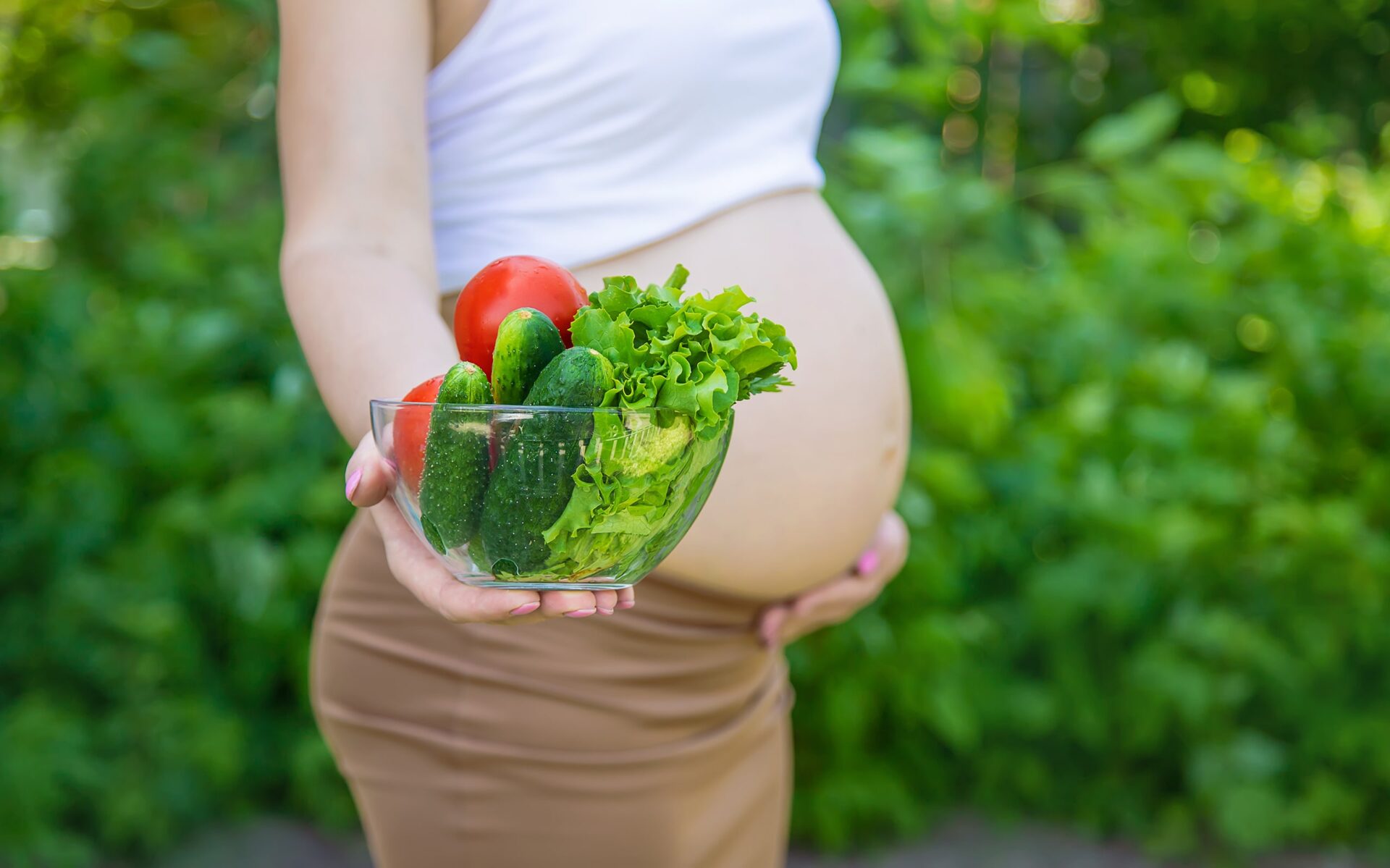
One of the best things you can do for yourself and your growing child during pregnancy is to eat a balanced, healthful diet. Acquiring the proper nutrition gives you an energy boost to get through those nine months and supports the growth and development of the fetus. To make sure our expecting women know what good pregnancy nutrition looks like, at our fertility clinic in Bangkok we are here to provide you with nutrition advice through our services. To nurture your infant and your body, follow these five important suggestions based on our years of experience.
Table of Contents
1. What Is Proper Nutrition for Pregnant Mothers?
satisfy these higher demands, concentrate your diet on foods high in nutrients such as:
- Fruits and vegetables (aim for a variety of colors)
- Whole grains like oats, brown rice, and whole wheat bread
- Lean proteins such as chicken, turkey, fish, eggs, beans, and lentils
- Low-fat or fat-free dairy products like milk, yogurt, and cheese
- Healthy fats found in nuts, seeds, avocados, and olive oil
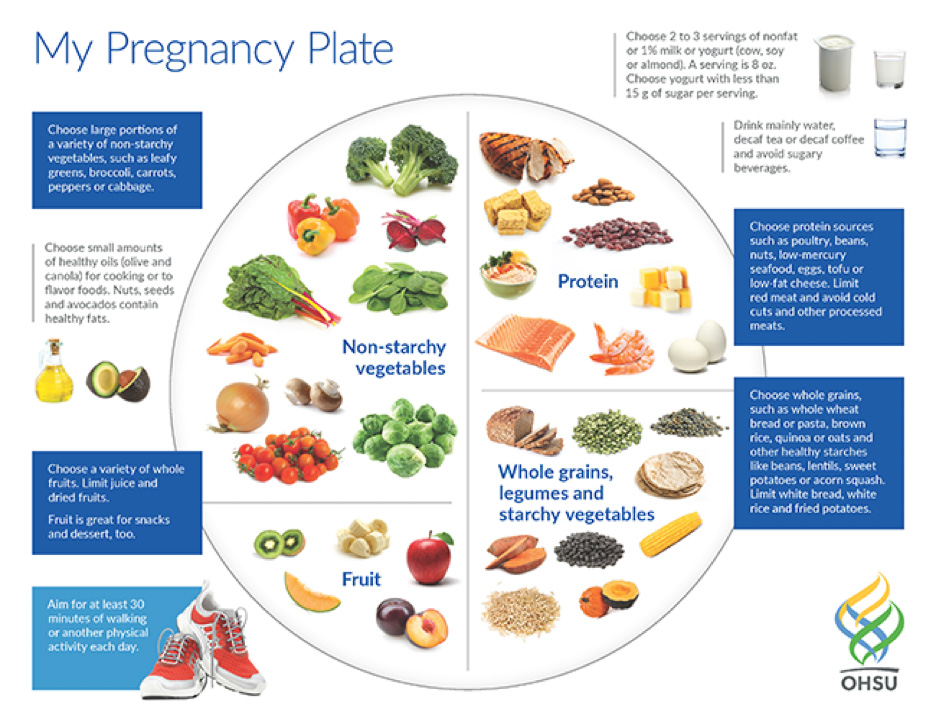
Accessed from: Center for Women’s Health website
Along with other vital micronutrients, you’ll also need to take a prenatal vitamin that includes folic acid, iron, calcium and vitamin D. This fills any gaps in terms of nutritional deficits.
Starting in the second trimester, most medical professionals advise adding 300 calories daily to help your baby grow. But those calories should come from wholesome, nutrient-dense meals, not from junk food or drinks high in added sugar.
2. What Special Nutrition Advice Is Given for the First Trimester?
First trimester calorie requirements are roughly equal to pre-pregnancy levels, but nutritional requirements increase almost straight away after conception. For the first few weeks, getting adequate folate—the natural form of folic acid—is essential to preventing neural tube abnormalities like spina bifida.
A supplement with at least 400 mcg of folic acid and foods high in folate can help one consume the 600–800 mcg of folic acid daily that is advised, along with folate-rich foods such as:
- Leafy greens
- Citrus fruits
- Beans and lentils
- Fortified cereals
Getting sufficient amounts of other key nutrients like iron, calcium, protein, and omega-3s is also very important in those early stages of fetal development.
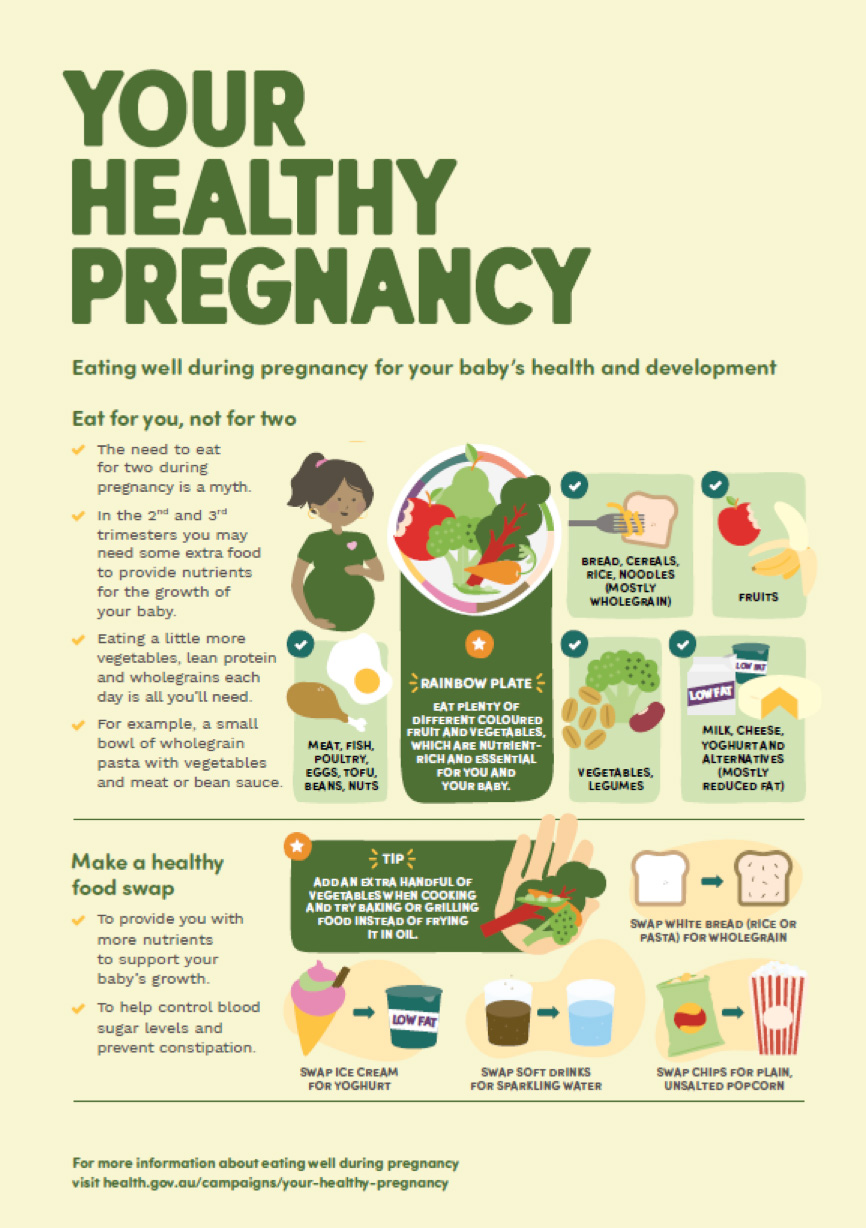
Accessed from: Australian Government website
3. What Is the Best Nutrition for New Mothers?
In comparison to women who are not pregnant or nursing, breastfeeding women also have higher nutritional demands. Nursing mothers usually need to eat 330–400 more calories per day than they did prior to pregnancy in order to maintain their energy levels and milk supply since producing breast milk burns an extra 500 calories per day.
In addition to the food groups mentioned above, focus on including these nutrients in your postpartum diet:
Protein
Lean proteins provide amino acids to produce breast milk. Aim for 25-35 grams per meal plus snacks containing protein.
Calcium & Vitamin D
These work together to keep your bones strong during breastfeeding and supply your baby. Low-fat dairy, canned fish with bones, leafy greens, and fortified juices/milks are great sources.
Omega-3s
Healthy fats found in fish, walnuts, flaxseeds, and eggs promote baby’s brain development. Have 1-2 servings of omega-3 foods daily.
Fluids
Drink lots of water, milk, and other fluids to stay hydrated and support milk production.
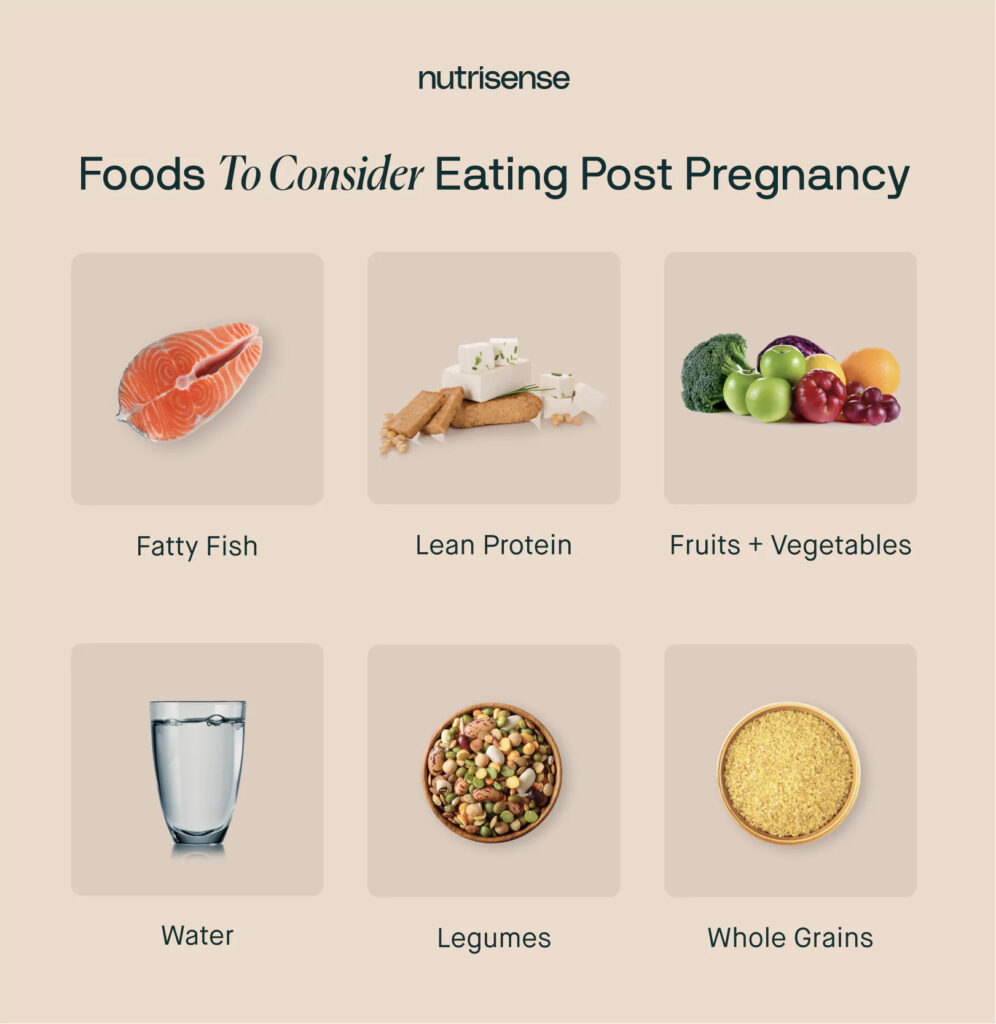
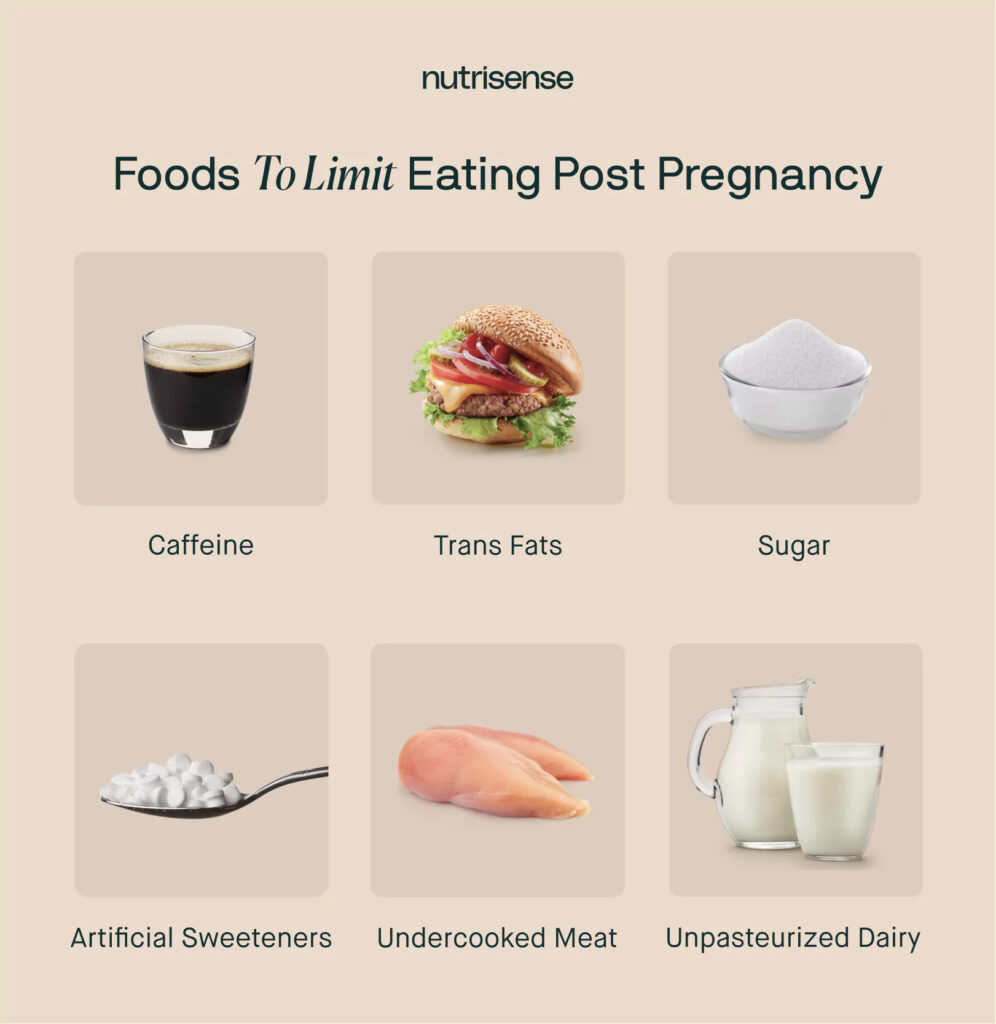
Accessed from: Nutrisense website
4. What Can a Pregnant Woman Do to Ensure a Healthy Newborn?
In addition to following a nutrient-rich pregnancy diet, these tips can help set you up for delivering a healthy baby:
Take a Prenatal Vitamin
Even with a balanced diet, it’s difficult to meet the increased nutrient demands through food alone. A quality prenatal multivitamin fills any gaps.
Stay Active
Aim for 30 minutes of moderate exercise most days to boost energy, reduce constipation, prepare for labor, and keep you fit.
Gain Weight Gradually
Work with your OB/GYN to understand how much weight gain is ideal based on your starting BMI. In general, gaining 25-35 lbs total is recommended for normal-weight women.
Get Enough Folic Acid
This B vitamin is critical for healthy neural tube formation, especially in the first trimester before many women know they’re pregnant. Take 400-800 mcg daily.
Increase Iron Intake
Blood volume increases dramatically in pregnancy, making iron needs double the normal amount. Eat iron-rich foods or take a supplement to prevent anemia.
Stay Hydrated
Drink plenty of fluids like water, milk, and fruit-infused waters to support higher blood volume, prevent constipation, reduce swelling, and supply breast milk after delivery.
5. Food Safety Comes First
Avoiding risky foods that may contain bacteria, viruses or parasites that could harm your baby is also crucial. Some foods to steer clear of include:
- Raw or undercooked meat, fish, eggs, or unpasteurized dairy/juices
- Processed meats like deli meat or hot dogs (unless heated through)
- Certain types of fish high in mercury like swordfish and tilefish
- Soft cheeses unless pasteurized
- Raw sprouts
- Unwashed produce
Never handle food carelessly; for example, cook meals through and prevent cross-contamination in the kitchen.
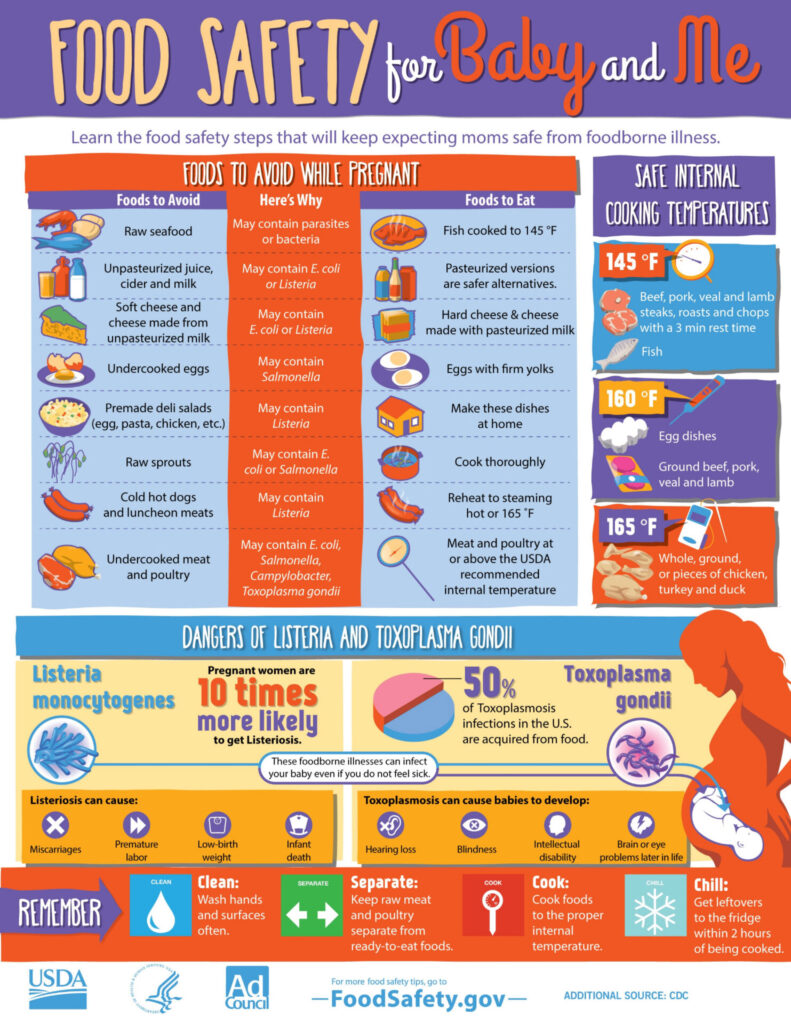
Accessed from: Food Safety government website
Supporting New Mothers to Be Healthy
A diet high in healthful foods and nutrients to support both you and your developing child is the foundation of a good pregnancy. Our fertility specialists at Bangkok Central Clinic offer in-depth nutritional advice so you may feel comfortable regaining control over your eating habits. If you are planning for pregnancy, get in touch with us now to arrange your consultation and let us walk you through each trimester.
HIGHLIGHTS
20 December 2020
5 yoga poses for couples to Enhance your relationship with your partner, level up your happiness in bed.
READ MORE20 December 2020
7 the procedure takes care of yourself and the wife before collecting eggs-collecting sperm.
READ MORE20 December 2020
Protein, a key nutrient of a woman, preparation for pregnancy- preparation for an egg collection.
READ MORE
Why Is It Important for a Health Check Up for Both Male and Female Before Getting Pregnant?
READ MORE


















